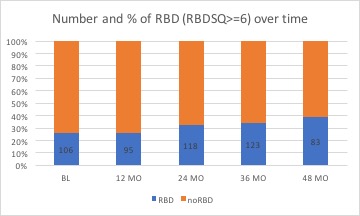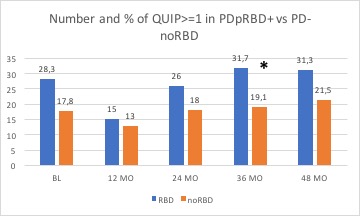Session Information
Date: Monday, October 8, 2018
Session Title: Parkinson's Disease: Non-Motor Symptoms
Session Time: 1:15pm-2:45pm
Location: Hall 3FG
Objective: To assess the prevalence of Impulse Control Disorder symptoms (ICD) in Parkinson’s disease with probable REM sleep behavior disorder (i.e. RBD assessed by questionnaire, PD pRBD+) compared to that in PD pRBD-, at baseline and annually for four years in a large cohort of PD patients using Parkinson’s Progression Markers Initiative (PPMI) data.
Background: We previously found a strong association between RBD and ICDs in Parkinson’s disease patients, first observing that patients with pRBD have an increased prevalence of ICD symptoms compared with PD patients without pRBD, regardless of dopamine replacement therapy (DRT) dose, PD duration and PD severity (1). We also observed an increased prevalence of vPSG-confirmed RBD in PD patients with ICD compared to those without an ICD (2).
Methods: Probable RBD was identified as RBDSQ score ≥6 according to the validated cut-off in PD. Symptoms of ICD+ were defined as QUIP score ≥1. Differences in proportion of patients ICD+ in PD pRBD+ vs. PD pRBD- were assessed by Chi-Squared test.
Results: Prevalence of PD pRBD+ patients was n=106/409 (26%) at baseline, 95/360 (26%) at year 1, 118/359 (32.8%) at year 2, 123/358 (34.3%) at year 3, and 83/213 (39%) at year 4. Prevalence of ICD+ was n=84/409 (20.5%) at baseline, 50/360 (13.8%) at year 1, 75/359 (20.9%) at year 2, 84/358 (23.5%) at year 3, and 54/213 (25.3%) at year 4. The proportion of ICD+ patients was significantly higher in PD pRBD+ patients compared to PD pRBD- both at baseline (28.3% vs. 17.8%, p=0.02) and increasingly so at year 3 (31.7% vs. 19.1%, p=0.006).
Conclusions: Both RBD and ICD symptoms increase over time in early PD. The higher prevalence of ICD symptoms reported in de novo untreated PD pRBD+ patients could suggest some shared disease-mediated neurobiological effects. The increase in ICD symptoms over time with initiation of DRT may be more pronounced in RBD patients. Ongoing analyses of this cohort will also assess the direction of the relationship between RBD and ICDs, as well as examine incident ICD behaviors specifically.
References: 1. Fantini, M. L. et al. Increased risk of impulse control symptoms in Parkinson’s disease with REM sleep behaviour disorder. J. Neurol. Neurosurg. Psychiatry (2015) 86, 174–1. 2. Fantini, M. L. et al. Sleep and REM sleep behaviour disorder in Parkinson’s disease with impulse control disorder. J. Neurol. Neurosurg. Psychiatry (2017). 89:305-310.
To cite this abstract in AMA style:
M.L. Fantini, F. Durif, JC. Corvol, D. Weintraub, C. Caspell-Garcia. Comorbid REM sleep behavior disorder and impulse control disorder symptoms in early parkinson’s disease: The PPMI cohort [abstract]. Mov Disord. 2018; 33 (suppl 2). https://www.mdsabstracts.org/abstract/comorbid-rem-sleep-behavior-disorder-and-impulse-control-disorder-symptoms-in-early-parkinsons-disease-the-ppmi-cohort/. Accessed December 23, 2025.« Back to 2018 International Congress
MDS Abstracts - https://www.mdsabstracts.org/abstract/comorbid-rem-sleep-behavior-disorder-and-impulse-control-disorder-symptoms-in-early-parkinsons-disease-the-ppmi-cohort/


